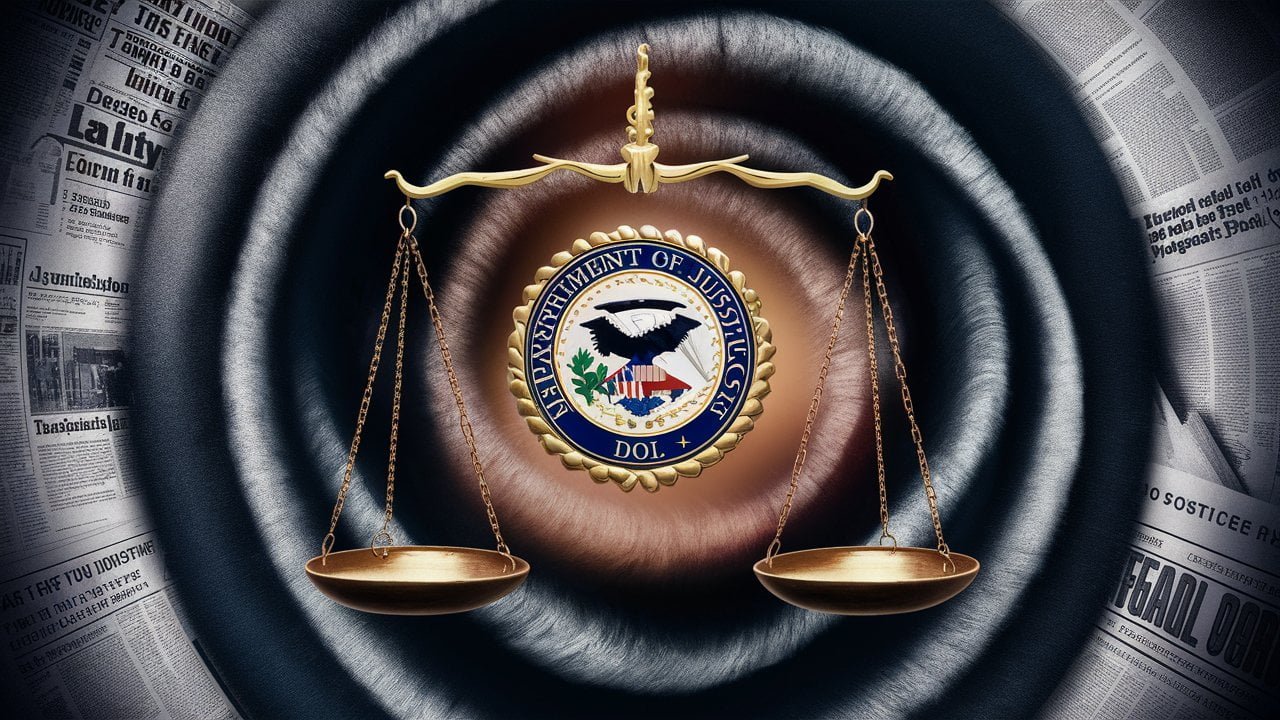In the intricate web of legal systems and government institutions, one entity stands as a pillar of justice: the Department of Justice (DoJ). With its immense significance in the legal realm, the DoJ plays a pivotal role in upholding the principles of law and order within society.
As legal professionals navigate the complex terrain of statutes and regulations, understanding the profound impact of DoJ’s directives is paramount for unraveling the fabric of our judicial system.
Serving as a cornerstone in preserving justice, the Department of Justice intricately weaves its mandates into the tapestry of government institutions. Its influence reverberates across courtrooms, law enforcement agencies, and legislative bodies alike, shaping the very foundation on which our legal framework rests.
The interplay between DoJ’s directives and their implications on individual liberties underscores a dynamic relationship that underscores every decision made within this esteemed department. By peeling back these layers, a deeper understanding emerges regarding how DoJ’s actions echo throughout our legal system, rendering it not just an institution but an embodiment of societal values in action.
Historical Evolution of DoJ.
The Department of Justice (DoJ) has a rich historical tapestry woven into the fabric of American law and governance. Established in 1870 during the tumultuous period of Reconstruction following the Civil War, the DoJ was born out of a necessity to consolidate legal matters and streamline the administration of justice at a federal level. Initially comprising mainly of legal advisors and solicitors, its mandate expanded gradually as society’s needs grew more complex.
One key milestone in its development was the passing of the Sherman Antitrust Act in 1890, which marked a significant shift towards regulating competition and fostering fair business practices. This legislation laid the foundation for DoJ’s role in enforcing antitrust laws to ensure a level playing field for businesses.
Over time, pivotal events like World War II catapulted the DoJ into new domains as national security took center stage. The establishment of the Office of Legal Counsel within DoJ became essential for providing guidance on sensitive governmental decisions while navigating constitutional boundaries.
The department’s evolution mirrored broader societal shifts, such as during the Civil Rights Movement when Attorney General Robert F. Kennedy played a crucial role in advancing civil rights enforcement within DoJ by appointing African American lawyers to key positions.
These transformative moments not only shaped the identity and functions of DoJ but also propelled it towards becoming a symbol of justice intertwined with America’s social progress.
As technology advanced and global threats evolved, so did the responsibilities and functions of the Department of Justice. From combating cybercrimes to addressing international terrorism, DoJ expanded its reach through specialized units like the Computer Crime and Intellectual Property Section (CCIPS) and National Security Division (NSD).
This adaptive capacity to embrace change enabled DoJ to sustain relevance in an ever-changing legal landscape while staying true to its core mission – upholding justice, defending federal interests, and safeguarding constitutional principles.
As we delve deeper into DoJ’s past, it becomes evident that its journey is not just about history but a testament to resilience and adaptability integral for any institution striving to meet society’s evolving needs effectively.
The Department of Justice (DoJ).
The Department of Justice (DoJ) operates with a complex organizational structure designed to efficiently carry out its mission of upholding justice and enforcing the laws of the United States. At the helm of this structure is the Attorney General, who serves as the chief law enforcement officer and legal advisor to the government.
Working closely with the Attorney General are various agencies and divisions within the DoJ, each playing a distinct role in fulfilling the department’s overarching objectives. For example, one key entity under DoJ is the Federal Bureau of Investigation (FBI), responsible for investigating federal crimes and national security matters nationwide.
Within DoJ’s organizational framework, there are specialized divisions dedicated to specific areas of law enforcement and legal oversight. The Civil Rights Division focuses on ensuring equal protection under the law, prosecuting civil rights violations, and promoting fair treatment for all individuals.
On the other hand, the Drug Enforcement Administration (DEA) tackles drug-related crimes and illicit activities that threaten public health and safety. Each division or agency within DoJ operates cohesively yet autonomously in handling distinct aspects of law enforcement while collectively reinforcing the overarching mission of justice.
Collaboration between these different components is essential for maintaining a robust legal system that upholds principles of fairness and accountability.
For instance, when investigating complex criminal cases that span multiple jurisdictions or involve various legal aspects, different divisions within DoJ often work together to ensure comprehensive prosecution and defense strategies are implemented effectively.
This collaborative approach not only streamlines operations but also enhances the department’s ability to respond swiftly to evolving challenges in crime prevention, detection, and prosecution. Ultimately, understanding the intricate organizational structure of DoJ sheds light on how diverse entities within this institution unite forces to deliver justice for all citizens.
Key Responsibilities of DoJ.
The Department of Justice (DoJ) shoulders a multitude of crucial responsibilities within the legal landscape, serving as the nation’s premier law enforcement agency. One of its key mandates is to investigate crimes perpetrated against the United States.
From complex financial fraud schemes to cybercrimes, the DoJ’s investigative arms, including the Federal Bureau of Investigation (FBI) and the Drug Enforcement Administration (DEA), work tirelessly to ensure justice is served and perpetrators are brought to account.
For instance, in high-profile cases like Operation Varsity Blues, where individuals were involved in a college admissions scandal, the DOJ’s investigation unearthed fraudulent activities that led to prosecutions.
Furthermore, the DoJ plays a vital role in prosecuting offenders who violate federal laws. By working alongside federal prosecutors across districts, it ensures that those who flout statutes ranging from drug trafficking to organized crime face legal consequences.
The successful prosecution of individuals involved in corruption or white-collar crimes exemplifies the DoJ’s commitment to upholding the rule of law at all levels. For instance, landmark cases like United States v. Enron Corp highlighted how DoJ prosecutors pursued corporate wrongdoing rigorously, showing their dedication to holding entities accountable for illicit actions.
In addition to investigating and prosecuting crimes, another critical responsibility undertaken by the Department of Justice is defending federal interests through civil litigation. Whether protecting federal programs from misuse or safeguarding national security interests through legal avenues, DoJ attorneys play a pivotal role in advocating for governmental entities.
Notable examples include cases related to immigration policy changes or challenges against regulations impacting environmental conservation efforts where lawyers from the Justice Department advocate on behalf of various government bodies with precision and expertise.
Such endeavors underscore how DoJ’s mandate transcends traditional law enforcement roles into domains essential for upholding governmental integrity and public welfare.
Impact of DoJ on Legal Professionals.
The Department of Justice (DoJ) wields substantial influence on the day-to-day practice of legal professionals across the United States. By setting legal precedents and policies, the actions of DoJ can significantly impact how lawyers approach cases and interpret laws.
For example, landmark cases such as Brown v. Board of Education in 1954, where DoJ attorneys successfully argued for school desegregation, not only reshaped civil rights law but also inspired a generation of legal professionals to advocate for social justice through litigation.
Moreover, opportunities for collaboration between DoJ and legal practitioners serve as a cornerstone for advancing justice in society. The department often partners with private law firms or pro bono legal teams on cases with far-reaching implications.
This collaboration not only enhances the quality of legal arguments presented but also fosters a sense of civic duty among legal professionals. For instance, joint efforts between DoJ attorneys and external counsel have been pivotal in prosecuting complex financial crimes or ensuring compliance with antitrust regulations.
Analyzing initiatives spearheaded by DoJ that have left a lasting impact on the legal community reveals the department’s commitment to upholding the rule of law. Projects like the Violence Against Women Act enforcement or extensive investigations into corporate fraud have shaped legal frameworks and enforcement practices embraced by lawyers nationwide.
These initiatives not only showcase DoJ’s dedication to combating various forms of wrongdoing but also serve as guiding lights for aspiring legal professionals looking to make a difference through their work in the justice system.
Transparency and Accountability at DoJ.
The Department of Justice (DoJ) has made significant strides in enhancing transparency and accountability within its operations. To ensure accountability, the DoJ has implemented various transparency measures, such as publishing annual reports detailing its activities and expenditures.
By providing detailed information to the public about its work, the DoJ aims to foster trust and confidence in its decision-making processes. Additionally, the DoJ has emphasized the importance of open communication with stakeholders to promote clarity and understanding of its policies.
Within the Department of Justice, mechanisms for oversight play a crucial role in maintaining ethical standards. The Office of the Inspector General (OIG) serves as an independent entity tasked with conducting audits and investigations to identify any misconduct or inefficiencies within the department.
Through rigorous oversight practices, the OIG helps uphold integrity and professionalism across all levels of the DoJ. These oversight mechanisms not only prevent abuses of power but also contribute to a culture of accountability that is essential in upholding justice.
Recent reforms and policies introduced by the Department of Justice underscore its commitment to enhancing transparency in decision-making processes. For instance, initiatives like the “sunshine laws” aim to increase public access to government information, including judicial proceedings and administrative records.
By embracing such reforms, the DoJ demonstrates a willingness to engage with stakeholders transparently while upholding high ethical standards. These efforts not only improve public perception but also set a precedent for other government agencies striving for greater openness in their operations.
In conclusion, transparency and accountability are fundamental principles guiding the Department of Justice’s actions as a key player in upholding justice within society.
By implementing robust transparency measures, maintaining strict oversight mechanisms, and enacting progressive reforms, the DoJ stands at the forefront of promoting ethical conduct and integrity in legal affairs. Upholding these values is paramount not only for ensuring trust in governmental institutions but also for safeguarding democratic principles that underpin a just society.
**Criticisms and Controversies Surrounding DoJ**
Over its long history, the Department of Justice (DoJ) has not been immune to criticisms and controversies. One consistent point of contention revolves around issues of accountability and transparency within the organization.
Critics argue that certain decisions by the DoJ lack sufficient transparency, leading to concerns about favoritism or lack of impartiality in legal proceedings. For example, in high-profile cases where political interests may intersect with legal actions, questions have arisen regarding whether the DoJ always operates independently from undue influence.
Furthermore, another area of scrutiny has been how the DoJ handles civil rights cases. Some advocacy groups and legal scholars have raised concerns about potential biases or inadequacies in addressing systemic discrimination or abuses of power.
The department’s response to protests involving alleged police misconduct has also sparked debates about equitable law enforcement practices across different communities.
On a different note, controversies related to national security measures overseen by the DoJ have drawn attention from both supporters and critics alike. While some view stringent security policies as essential for safeguarding the country’s interests, others caution against potential violations of privacy rights and civil liberties in pursuit of these objectives.
The balance between ensuring national security and protecting individual freedoms remains an ongoing challenge for the Department of Justice amidst evolving threats and societal norms.
In conclusion, acknowledging criticisms and controversies surrounding the Department of Justice is fundamental to fostering informed discussions on how best to uphold justice in society.
By presenting diverse perspectives on contentious issues related to DoJ’s actions or policies, stakeholders can engage constructively in efforts to address challenges faced by the department while upholding core principles of fairness and accountability in governance.
Future Outlook for DoJ
Looking ahead, the Department of Justice (DoJ) is poised to navigate a rapidly evolving landscape in law enforcement and justice administration. One notable aspect of its future development includes adapting to emerging trends that shape the legal arena.
As technology continues to advance, the DoJ faces the challenge of integrating new tools for more effective investigations and enforcement actions.
For instance, the increasing use of artificial intelligence and data analytics in identifying patterns of criminal behavior may revolutionize how prosecutors build cases in the coming years. Embracing these technological advancements can enhance the efficiency and accuracy of DoJ operations.
Moreover, changes in societal expectations around accountability and transparency are likely to influence the future course of the Department of Justice. With growing demands for openness in decision-making processes, the DoJ may need to further bolster its mechanisms for public oversight and ethical conduct to maintain trust and credibility.
Implementing robust systems that promote transparency could not only bolster public confidence but also serve as a safeguard against potential abuses of power within the agency.
In addition, as global challenges such as cybercrime, terrorism, or transnational organized crime become increasingly complex, the DoJ will need to foster stronger collaborations with international partners to address cross-border legal issues effectively.
Strengthening diplomatic ties with foreign counterparts and participating in joint initiatives can amplify the reach and impact of DoJ efforts on a global scale. By aligning strategies with international standards and best practices, the Department can enhance its ability to combat evolving threats that transcend national boundaries effectively.
In conclusion, by embracing innovation, reinforcing ethical standards, fostering international alliances, and adaptively responding to societal shifts, the Department of Justice is poised to uphold its mission effectively while navigating an ever-changing legal landscape.
Proactively addressing these future challenges will be crucial for ensuring that DoJ remains a cornerstone of justice administration both domestically and internationally.
Conclusion: Unveiling The Significance Of The Article In Law.
In the journey through the Department of Justice’s historical evolution, organizational structure, key responsibilities, impact on legal professionals, transparency efforts, controversies faced, and future prospects, a comprehensive understanding of the DoJ’s immense importance in the legal realm emerges.
By shedding light on how the DoJ investigates crimes, upholds civil rights, and provides legal guidance to government agencies, this article underscores the pivotal role it plays in safeguarding justice within society.
Through unveiling both the accolades and criticisms surrounding the Department of Justice, this exploration has equipped legal professionals and concerned citizens with a well-rounded perspective on an institution that holds substantial power over law enforcement and legal proceedings.
As we peer into the future of DoJ amidst technological advancements and shifting paradigms in justice administration, it becomes evident that staying informed about its operations is crucial for anticipating changes that may influence the legal landscape.
This comprehensive analysis thus serves as a valuable resource for those eager to comprehend and navigate the complexities inherent in one of America’s most influential governmental bodies.




